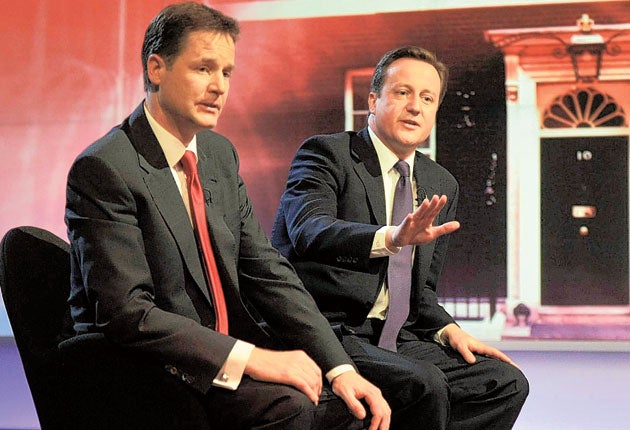Andrew Grice: Budget cuts mean the coalition charm offensive is over
Inside Politics

Fifty days into their coalition, David Cameron and Nick Clegg have been taking stock. They would both have settled with being where they are today and, if they were being honest, might even have settled for a bit less.
The Tory and Liberal Democrat leaders have bonded and joke that they get on "20 times better than Tony Blair and Gordon Brown". Not their most difficult task, perhaps. But the coalition leaders guessed that the honeymoon would end with this week's Budget and it did.
The time for jokes and smiles was long gone and their faces were stern – even older – when they took questions on a BBC programme on Wednesday from voters upset about the looming spending cuts. It brought a rare moment of apparent disharmony near the end, when they simultaneously tried to make a point and talked across each other like the rival politicians they were in the election TV debates.
In fact, Mr Cameron was merely trying to ride to the rescue of the man he jokingly calls "my civil partner". He thought it would be more helpful to Mr Clegg if he gave the Liberal Democrats the full credit for the £1,000 rise in personal tax allowances rather than for Mr Clegg to claim it.
The Prime Minister is well aware that his deputy is often seen as his human shield for the deep cuts announced by George Osborne in the Budget. He thinks it's partly a media judgment as people such as me, raised on a diet of stories about splits within parties, look for the inevitable tensions in the coalition. But there's no smoke without fire and plenty of Tory and Liberal Democrat MPs think that Mr Clegg's party is providing invaluable cover for the cuts.
There are real jitters among senior Liberal Democrat MPs over the VAT rise and the cuts which they fear, contrary to the coalition's spin, will hurt the poorest hardest. They worry that Mr Osborne may not have a Plan B if his gamble – that the private sector will fill the public-sector gap to produce exports and growth – does not pay off.
Mr Cameron and Mr Clegg decided early on that they would rather aim high through trade-offs and give-and-take than implement only what their parties agreed on at the outset. One example was the Tories accepting the rise in tax thresholds in return for the Liberal Democrats swallowing Tory plans for welfare reform.
These changes, being drawn up by Iain Duncan Smith, the Secretary of State for Work and Pensions, are likely to target the sick and disabled – an area conspicuously missing from the £11bn down-payment on welfare cuts in the Budget. This was not because they will not happen but because they will be worked up over the summer.
The Cameroons believe the coalition, with an in-built Commons majority of about 70, can achieve more radical things than a Tory Government with a narrow majority could have done. But that doesn't mean that they didn't want to win last time or that they don't want to win outright next time after winning the voter trust they failed to secure in opposition.
The two leaders think Labour's attacks on them drive them even closer together and believe that Labour, which unwisely seems intent on opposing every spending cut, will marginalise itself by vacating the centre ground.
But even if the Cameron-Clegg love-in lasts and the coalition holds, the leaders believe their two parties will fight the next election as opponents, not in any electoral pact.
Not all the coalition's boxes have been ticked yet. Both leaders are impatient to talk about reforms, and give a dangerous impression to the voters that looks like they are obsessed with cuts. Mr Cameron wants to translate his rhetoric about creating a "big society", which failed to enthuse the voters during the election campaign, into some tangible, decentralising public service reforms. There will be a raft of announcements over the summer months.
Mr Clegg, meanwhile, needs to throw some meat on political reform to his own party. A date for a referendum on changing the voting system at general elections, probably next May, will be announced soon.
The Liberal Democrat leader also wants a guarantee that if people vote in favour of the alternative-vote system, it would definitely be introduced by the next election.
The Budget was skilfully presented by Mr Osborne. His allies rightly liken him to a chess player who sees several moves ahead. He told it pretty straight, even if overplaying his claim that his package was "progressive". The instant opinion polls were surprisingly favourable; the public know that something must be done about the deficit.
I suspect the polls will be less favourable when the detail emerges in October of the 25 per cent average cuts outside the protected health and overseas-aid budgets, not to mention the further welfare cuts. It will be harder to call it a progressive Budget then.
One Cameroon said: "We don't want this government to be all about cuts, cuts, cuts." They are likely to be disappointed.
Join our commenting forum
Join thought-provoking conversations, follow other Independent readers and see their replies
Comments